 |
|
|
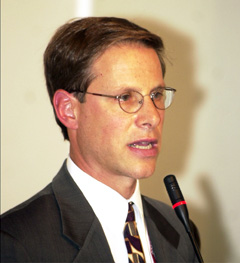 |
|
Ron Benioff, NREL, stresses the importance of technological needs assessments for promoting the transfer and implementation of technology
|
|
 |
 |
|
CTI activities with developing countries
Presented by the International Energy Agency and Climate Technology Initiative (CTI)
Elmer Holt, US Department of Energy, said a key element for reducing GHG emissions in developing countries is the rapid diffusion of climate change technology through capacity building and technology transfer. He stressed the need to facilitate conditions for business partnerships and sustainable technology transfer, emphasizing that technology transfer requires a combination of capacity building, technological needs assessments, enabling environments, financial means, and access to technology information.
 Listen to Elmer Holt Listen to Elmer Holt
Morihiro Kurushima, New Energy and Industrial Technology Development Organization (NEDO), gave an overview of CTI activities focusing on results from its climate technology implementation plan activities, and the ongoing series of CTI/industry joint seminars on, inter alia, technology diffusion, and technology information and needs assessments.
Ron Benioff, National Renewable Energy Laboratory (NREL), reviewed the technological needs assessments and cooperative technology implementation plans facilitated by CTI. He explained that CTI facilitates technological needs assessment workshops, technological assistance, cooperative technology implementation plans to support implementation of selected high-priority technologies, awards programmes, and the dissemination of technology information. He emphasized technological needs assessments as a way to identify effective actions to promote technology implementation.
|
|
 |
|
|
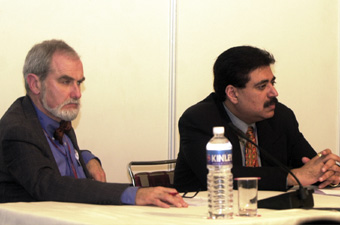 |
|
Elmer Holt (left) with Rakesh Bakshi
|
|
 |
 |
|
William Bonsu, Ghana, reported on the results of CTI activities in Ghana, highlighting the benefits secured through assessments, the creation of a development plan, and selection of priority areas for technology transfer.
Rakesh Bakshi, Vestas RRB, highlighted the tremendous potential of India regarding renewable energy generation and as a clean energy technology exporter. He stressed that CTI is working to facilitate the export of technology from India and underscored India's commitment to promoting renewable energy.
 Listen to Rakesh Bakshi Listen to Rakesh Bakshi
Norio Shigetomi, NEDO, outlined the results of CTI's questionnaire on Chinese technology transfer needs, including the finding that most respondents believed that GHG emissions reductions are important for China and that technology transfer is important for emissions reductions. He set out the categories of technology transfer that the respondents felt were most important, the industrial sectors that they believed need technology transfer, and the barriers that they saw as preventing technology transfer to China.
|
|
 |
 |
|
Johtaro Hirano, NEDO, outlined the results of recent CTI workshops, which focused on, inter alia, energy saving, green productivity, zero emissions, and environmental management systems.
Moussa Cisse, ENDA-TM, summarized the preparations underway for the CTI African regional workshop to be held in Dakar in December 2002.
|
 |
|
|
|
 |
|
|
|
 |
|
|
|
 |
|
|
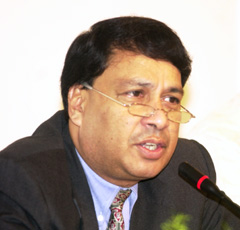 |
|
Ajay Shankar, Indian Ministry of Power, underscores that per capita carbon dioxide emissions in India amount to 0.93 tons, whereas the world average is 3.87 tons and the US emits 20.1 tons
|
|
|
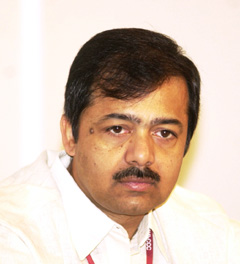 |
|
Shashi Shekhar, Indian Ministry of Power, says old power stations should be upgraded to improve operating efficiency
|
|
 |
 |
|
Power sector reform
Presented by the Indian Ministry of Power
Ajay Shankar, Indian Ministry of Power, underscored that India represents one-fifth of the world's population, but produces only 2.7% of global carbon dioxide emissions. He stated that although energy generation in India has increased, there are still supply shortages. Stressing that 80,000 villages and 60 million households in India lack electricity, he said the most important development challenge is to provide electricity to all households by 2012. Shankar said providing rural villages with commercial electricity will reduce their dependence on wood fuel and kerosene, and lower GHG emissions.
He underscored that the growth of the power sector is essential for economic growth and for providing basic minimum human needs. He explained that India plans to increase its energy production by 100,000 megawatts over the next decade, and that nuclear power and large-scale hydropower are important environmentally friendly energy sources. Noting that only 17% of the country's hydropower potential has been tapped, he highlighted the Government's goal to fully develop the remaining potential. He emphasized the need to reduce carbon intensity through energy diversification, enhance energy efficiency, upgrade technologies, rationalize power tariffs, encourage demand-side management, and introduce standards and labeling for equipment and appliances. He said a large afforestation programme is likely to take place in India during the next decade.
Shashi Shekhar, Indian Ministry of Power, described energy efficiency improvements in the thermal power sector, noting that India has advanced from 25% to 36% efficiency, and aims to become 39-41% efficient. Explaining that the National Thermal Power Corporation's Centre for Power Efficiency and Environmental Protection (CenPEEP) aims to improve power plant efficiency and reduce carbon dioxide per unit of electricity generated, he highlighted that CenPEEP won CTI's World Climate Technology Award, which will be presented at COP-8. He noted that India has recently enacted an Energy Conservation Act, set new targets for energy conservation in the public and private sector, and established a Bureau of Energy Efficiency.
Regarding CDM opportunities in India, Shekhar highlighted the importance of shifting toward super-critical, ultra super-critical, and other advanced technologies for coal-based power generation. He stressed that a 1% energy efficiency improvement in thermal power plants would result in carbon dioxide emission reductions estimated at 8.4 million tons per year. He concluded that India has CDM investment opportunities worth US$173 billion, including US$6 billion for rural electrification and US$2 billion for energy conservation.
|
|
 |
|
|
|
 |
|
|
|
 |
|
|
|
|
|
 |
 |
|
New look at "dangerous interference": Perspectives for the future
Presented by the Nature Conservancy in collaboration with Environmental Defense, Conselho Nacional dos Seringueiros and the Amazon Institute of Environmental Research (IPAM)
Annie Petsonk, Environmental Defense, addressed the issue of what constitutes dangerous interference with the climate system. She highlighted that stabilizing atmospheric carbon dioxide concentrations at 450 parts per million (ppm),will cause a 1°C temperature increase over the next 100 years and the widespread destruction of coral reefs. She said stabilization at 550 ppm will cause a 2°C temperature increase, an increased risk of break-up of the West Antarctic ice sheet, and a sea-level rise of four to six meters. At 650 ppm, she noted that average temperatures will rise by 3°C, causing a risk of Gulf Stream circulation shutdown and a sharp fall in temperatures in Northern Europe. Petsonk called for policy decisions that allow stabilization at 450 ppm, and stressed that achieving this goal will require aggressive reductions in absolute greenhouse gas (GHG) emissions soon after 2012. Otherwise, she said, the opportunity to avert dangerous climate change may be lost forever. She concluded that if absolute emissions reductions of industrialized countries are delayed until 2020, global absolute emissions would need to decline 2-8% annually to stabilize concentrations at 450 ppm.
Marcio Santilli, IPAM, discussed deforestation and its consequences on climate change and emphasized the correlation between paved roads and deforestation. He highlighted that deforestation is an important source of carbon dioxide emissions, particularly in Brazil where at least two-thirds of emissions result from deforestation. He cautioned against confusing forests with commercial tree plantations, and stressed that native forests have a complex relationship with the climate system that affects, inter alia, rainfall patterns and water resources. He underscored that 60 million hectares, or 15% of Brazilian forests, have been lost, and noted that forest fires can destroy millions of hectares per year. He highlighted that current annual deforestation will offset a major portion of the Kyoto Protocol's benefits and concluded that good governance is key for mitigating carbon dioxide emissions from deforestation in the Amazon.
|
|
 |
 |
|
Marcelo Rocha, Instituto de Pesquisas Ecológicas, described potential clean development mechanism (CDM) projects, including the creation of legal reserve areas for conservation and reforestation, and the development of settlements based on agroforestry systems. Noting that the cost of these projects will be higher than many other CDM projects, he stressed the additional benefits of such projects, including income generation, water protection, and biodiversity conservation.
Discussion: Participants discussed: whether stabilizing atmospheric carbon dioxide concentrations at 450 ppm is sufficient; the merits of carbon sequestration versus emissions reductions; and the relationship between forest fires and paved roads in Amazonia.
|
 |
|
|
|
 |
|
|
|
 |
|
|
|
 |
|
|
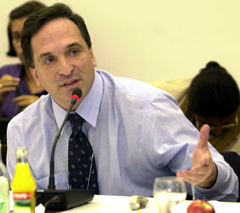 |
|
Fabio Feldmann, BFCC, introduces biblioclima, the first virtual library for climate change in Latin America
|
|
 |
 |
|
Scientific and stakeholder inputs to climate change
policy: The role of the Brazilian Forum on Climate Change
Presented by the Brazilian delegationMarine Grossi, Brazil, introduced the Brazilian Forum on Climate Change (BFCC), an institutional interface between the Brazilian Government and civil society, created in June 2000 by Presidential decree. She said the Forum is composed of representatives from ministries, government institutions and agencies, banks, universities, research institutions, non-governmental organizations, business, the media, and opinion leaders. She explained that the BFCC follows climate change negotiations and provides capacity building and awareness-raising through technical meetings, publications and online information. She stressed the organization of the Forum in Thematic Chambers on: socioeconomic impacts; juridical matters; renewable sources of energy; hydrological resources; biodiversity; land use, land use change and forestry; and information, communication and education. She said that the Chambers provide information, serve as an opportunity for high-level debate and technical discussions, ensure collection of data and dissemination of knowledge, and prepare proposals for climate change measures.
|
|
 |
 |
|
Fabio Feldmann, BFCC, emphasized that the Forum is presided by the President of Brazil. He stressed the role of the Forum as a briefing mechanism for the President before international negotiations, and a means of ensuring dialogue between the President and stakeholders. He also introduced the biblioclima initiative, which provides the first virtual library on climate change in Latin America.
Luiz Figueiredo Machado, Brazil, stressed the importance of the BFCC for the Government. He explained that modern diplomacy involves active participation of Heads of States and governments in negotiations, and emphasized the need for them to receive first-hand advice on technical subjects, such as climate change. Figueiredo Machado welcomed the Forum as a way to implement Article 6 of the UNFCCC, on education, training and public awareness. He said the Forum is concerned with transparency, awareness raising, and participation, and stressed that the Government supports the Forum but does not direct it.
Marco Fujihara, PLANTAR, emphasized the importance of the Forum for involving all stakeholders in climate change discussions, and highlighted the benefits of the initiative for the private sector.
Discussion: Participants discussed: the influence of elections for the presidency of the BFCC; links between ministries; the establishment of a special national authority for climate change; activities for awareness raising, particularly of the media; and the BFCC as a consultative process rather than a decision-making one.
|
 |
|
|
|
 |
|
|
|
 |
|
|
|
 |
|
|
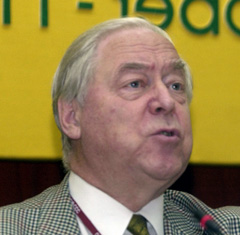 |
|
Yuri Izrael, International Organization Committee, noted that the World Conference on Climate Change to be held in Moscow next year, is not designed as a negotiation forum but as an opportunity to stimulate discussions between governments, scientists and civil society
|
|
 |
 |
|
World Conference on Climate Change
Presented by the Russian delegation in collaboration with the Institute of Global Ecology and Climate and the Russian Academy of Science
Michael Gytarsky, Institute of Global Climate and Ecology, gave an overview of climate change conferences since 1979, highlighting the establishment of the Intergovernmental Panel on Climate Change in 1988 and the adoption of the UNFCCC in 1992. He said the proposed World Conference on Climate Change, to be held in Moscow on 29 September - 3 October 2003 in Moscow, is a continuation of previous conferences, and highlighted it as a unique opportunity to improve interactions between governments, business, and civil society representatives involved in climate change processes. He noted that the topics for discussion include: climate models; extreme events; predictions of climatic changes; ecological, social and economic consequences; mitigation of anthropogenic impacts; the Kyoto Protocol and its developments; the UNFCCC's future; possible future protocols; and the enhanced role of developing countries in finding solutions to climate issues. He explained organizational arrangements for the Conference, including the tasks of the International Organizing Committee, Programme Committee, National Organizing Committee and Executive Secretariat. He said the Conference will hear presentations, have oral and poster sessions, and that the proceedings will be published.
|
|
 |
 |
|
Yuri Izrael, International Organizing Committee for the World Conference on Climate Change, stressed that the Conference will not only consider scientific issues related to climate change but also socioeconomic impacts, and explained that the Conference is designed as a meeting among scientists, the business sector, and politicians. He said the Conference would convene in a high-level segment, followed by scientific, socioeconomic, political, and public society segments.
Discussion: Participants discussed: possible connections between the Conference and Russia's ratification of the Kyoto Protocol; whether the Conference will be a forum for negotiations; the scientific basis of the Kyoto Protocol; links between the Conference and the UN system; and the aims and expected outcomes of the Conference, including analyzing the Kyoto Protocol in the context of post-ratification.
|
|